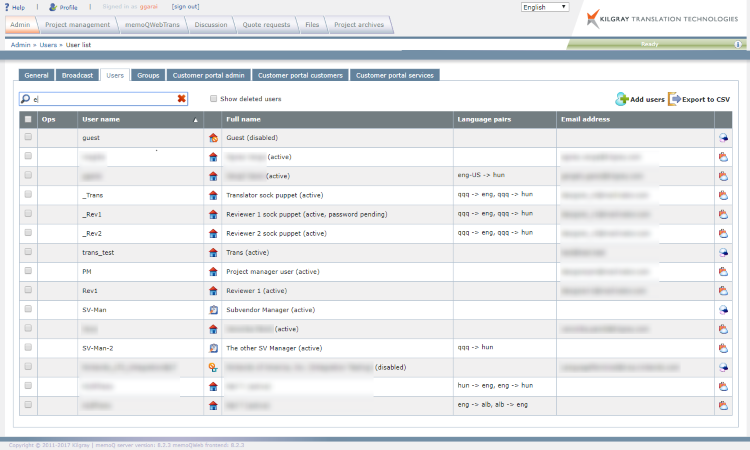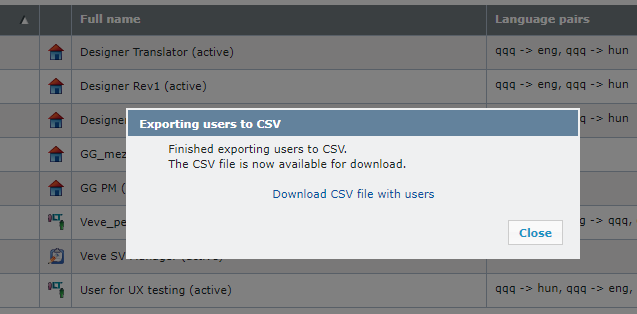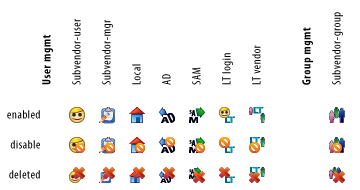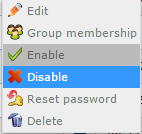Users
You can manage the users who have access the resources (translation memories, term bases, etc.) and projects on the memoQ server. Create new users, modify the details of existing users - including their group membership - or delete users who no longer need access to the server.
How to get here
- Open memoQWeb in a Web browser. Log in as an administrator or a project manager.
- Click the Admin tab, then click the Users tab below it.
- The Users page appears.

What can you do?
To add a new user: Click Add users above the list.
To see deleted users: check the Show deleted users check box.
To search for a user: Enter part of a user name in the Search field and press Enter.
To sort the table: Click a column header to sort by that column. Click the arrow in the column header (e.g. next to User name in the screenshot) to reverse the sorting order.
To export the list of all users: Click the Export to CSV icon above the list. The Exporting users to CSV window appears, and after a while, it displays the Download CSV file with users link. Click the link to download the file. Click Close to close the Exporting users to CSV window. View or edit this file in Microsoft Excel.
Only users who exist on the server itself, and only users that you can see: memoQWeb does not export users who are registered in a different place (e.g. Language Terminal or a Windows domain). If you are a subvendor manager, you can only export the members of your organization. If you own the server, but it contains subvendor organizations, you cannot see or export the subvendors' users.

The CSV file has these columns: Username, Full name, Email, Address, Phone number, Mobile phone, Package workflow setting, Language pairs, Group membership, User can edit information on memoQWeb, User can edit language properties on memoQWeb, User is disabled.
The Users table
- Ops: You can see here what you can do with the user you are pointing at.
To select all users: Check the check box next to the Ops column header.
To change a user's details: Click the Edit ![]() icon. The Edit user window appears with the user's details. You can change all of them except User name. To confirm your changes, click Save.
icon. The Edit user window appears with the user's details. You can change all of them except User name. To confirm your changes, click Save.
Note: If you click the Edit button for a Language Terminal user, fields in the User properties section are all grayed out.
To reset a user's password: click the Reset password![]() icon. You cannot reset passwords for SSO user accounts (SAM/AD/LT). If a user has forgotten his password, they can click the link on the memoQWeb sign in page to request a new password. They need to enter their user name and will receive a notification email with a link to memoQWeb's password reset page.
icon. You cannot reset passwords for SSO user accounts (SAM/AD/LT). If a user has forgotten his password, they can click the link on the memoQWeb sign in page to request a new password. They need to enter their user name and will receive a notification email with a link to memoQWeb's password reset page.
To delete selected users: Click the Delete ![]() icon. You need to confirm the deletion: in the Delete users window, type yes in the text field and click OK. To not complete the deletion, click Cancel.
icon. You need to confirm the deletion: in the Delete users window, type yes in the text field and click OK. To not complete the deletion, click Cancel.
Deleting users cannot be undone: Confirm the deletion only if you are absolutely sure that you know what you are doing.
Note: When you delete a user, the user is removed from the Users tab and loses any resource permissions and implicit project permissions.
Important: To make sure that it is always possible to manage the server, you cannot delete the built-in admin user.
Note: If you want to exclude a user from the server for a short time, disable their account, do not delete it. Select the user and click Edit, then check the Login disabled check box.
- User name: This column shows the user name used for signing in to the server.
- The next column shows the user/group types:

- Full name: This column contains the user's full name and status info in parenthesis - whether the user is active or inactive (was disabled) or locked or password pending; it can also be combined e.g. active, password pending:

Click the Edit icon to enable or disable user access. - Language pairs: This column displays the language pairs that the user can work with.
- Email address: This column shows the user's email. The memoQ server sends email notifications to this address.
- The last column shows the package workflows allowed to the user.
- User can both work with packages and check out online projects:

- User can only work with packages:

- User can only check out online projects:

The context menu
Right-click a user. A context menu appears with frequent actions you can perform on users:

Note: You can manage more than one user at once - the context menu works on all selected users.
- Edit: Opens the Edit user page to edit a user's details, such as their email.
- Group membership: Opens the Change group membership page. This table is also part of the Edit user page.
-
Enable: This is only available if one of the selected users is disabled. You need to confirm the enabling.
Note: users who just created a new password or have reset their password will not be enabled. This is to avoid user accounts unprotected by password.
- Disable: This is only available if one of the selected users is enabled. You need to confirm the enabling. A disabled user is not deleted, but is inactive: they cannot sign in to the memoQ server or memoQWeb.
- Reset password: You need to confirm resetting the password of the selected users. The users receive a notification email with a password reset link.
- Delete: You need to confirm deleting the selected users. This operation cannot be undone.